Andreas Herzig
IRIT-LILaC
SNN-Based Online Learning of Concepts and Action Laws in an Open World
Nov 19, 2024Abstract:We present the architecture of a fully autonomous, bio-inspired cognitive agent built around a spiking neural network (SNN) implementing the agent's semantic memory. The agent explores its universe and learns concepts of objects/situations and of its own actions in a one-shot manner. While object/situation concepts are unary, action concepts are triples made up of an initial situation, a motor activity, and an outcome. They embody the agent's knowledge of its universe's actions laws. Both kinds of concepts have different degrees of generality. To make decisions the agent queries its semantic memory for the expected outcomes of envisaged actions and chooses the action to take on the basis of these predictions. Our experiments show that the agent handles new situations by appealing to previously learned general concepts and rapidly modifies its concepts to adapt to environment changes.
Reasoning About Action and Change
Jun 27, 2024Abstract:The purpose of this book is to provide an overview of AI research, ranging from basic work to interfaces and applications, with as much emphasis on results as on current issues. It is aimed at an audience of master students and Ph.D. students, and can be of interest as well for researchers and engineers who want to know more about AI. The book is split into three volumes.
Solving Gossip Problems using Answer Set Programming: An Epistemic Planning Approach
Sep 22, 2020
Abstract:We investigate the use of Answer Set Programming to solve variations of gossip problems, by modeling them as epistemic planning problems.
* In Proceedings ICLP 2020, arXiv:2009.09158
Refining HTN Methods via Task Insertion with Preferences
Nov 29, 2019


Abstract:Hierarchical Task Network (HTN) planning is showing its power in real-world planning. Although domain experts have partial hierarchical domain knowledge, it is time-consuming to specify all HTN methods, leaving them incomplete. On the other hand, traditional HTN learning approaches focus only on declarative goals, omitting the hierarchical domain knowledge. In this paper, we propose a novel learning framework to refine HTN methods via task insertion with completely preserving the original methods. As it is difficult to identify incomplete methods without designating declarative goals for compound tasks, we introduce the notion of prioritized preference to capture the incompleteness possibility of methods. Specifically, the framework first computes the preferred completion profile w.r.t. the prioritized preference to refine the incomplete methods. Then it finds the minimal set of refined methods via a method substitution operation. Experimental analysis demonstrates that our approach is effective, especially in solving new HTN planning instances.
Relaxing Exclusive Control in Boolean Games
Jul 27, 2017
Abstract:In the typical framework for boolean games (BG) each player can change the truth value of some propositional atoms, while attempting to make her goal true. In standard BG goals are propositional formulas, whereas in iterated BG goals are formulas of Linear Temporal Logic. Both notions of BG are characterised by the fact that agents have exclusive control over their set of atoms, meaning that no two agents can control the same atom. In the present contribution we drop the exclusivity assumption and explore structures where an atom can be controlled by multiple agents. We introduce Concurrent Game Structures with Shared Propositional Control (CGS-SPC) and show that they ac- count for several classes of repeated games, including iterated boolean games, influence games, and aggregation games. Our main result shows that, as far as verification is concerned, CGS-SPC can be reduced to concurrent game structures with exclusive control. This result provides a polynomial reduction for the model checking problem of specifications in Alternating-time Temporal Logic on CGS-SPC.
* In Proceedings TARK 2017, arXiv:1707.08250
Strategically knowing how
May 15, 2017
Abstract:In this paper, we propose a single-agent logic of goal-directed knowing how extending the standard epistemic logic of knowing that with a new knowing how operator. The semantics of the new operator is based on the idea that knowing how to achieve $\phi$ means that there exists a (uniform) strategy such that the agent knows that it can make sure $\phi$. We give an intuitive axiomatization of our logic and prove the soundness, completeness, and decidability of the logic. The crucial axioms relating knowing that and knowing how illustrate our understanding of knowing how in this setting. This logic can be used in representing both knowledge-that and knowledge-how.
Simple epistemic planning: generalised gossiping
Jun 14, 2016
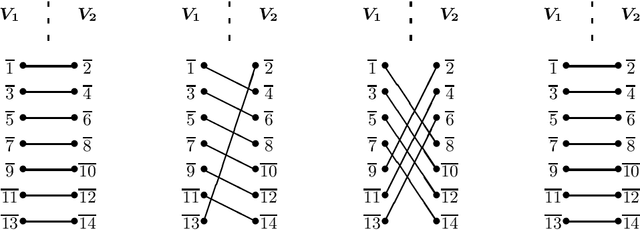


Abstract:The gossip problem, in which information (known as secrets) must be shared among a certain number of agents using the minimum number of calls, is of interest in the conception of communication networks and protocols. We extend the gossip problem to arbitrary epistemic depths. For example, we may require not only that all agents know all secrets but also that all agents know that all agents know all secrets. We give optimal protocols for various versions of the generalised gossip problem, depending on the graph of communication links, in the case of two-way communications, one-way communications and parallel communication. We also study different variants which allow us to impose negative goals such as that certain agents must not know certain secrets. We show that in the presence of negative goals testing the existence of a successful protocol is NP-complete whereas this is always polynomial-time in the case of purely positive goals.
Tableaux for Dynamic Logic of Propositional Assignments
Jun 09, 2014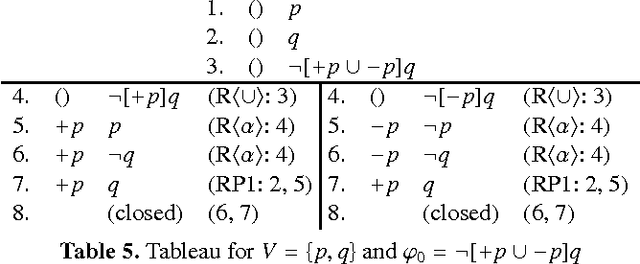
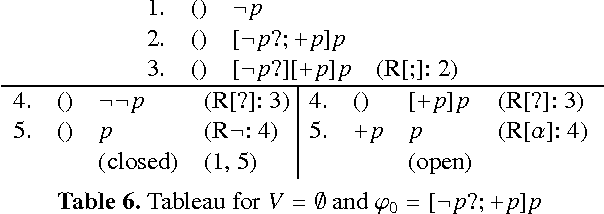
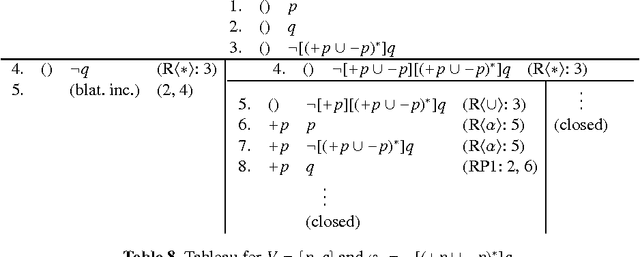
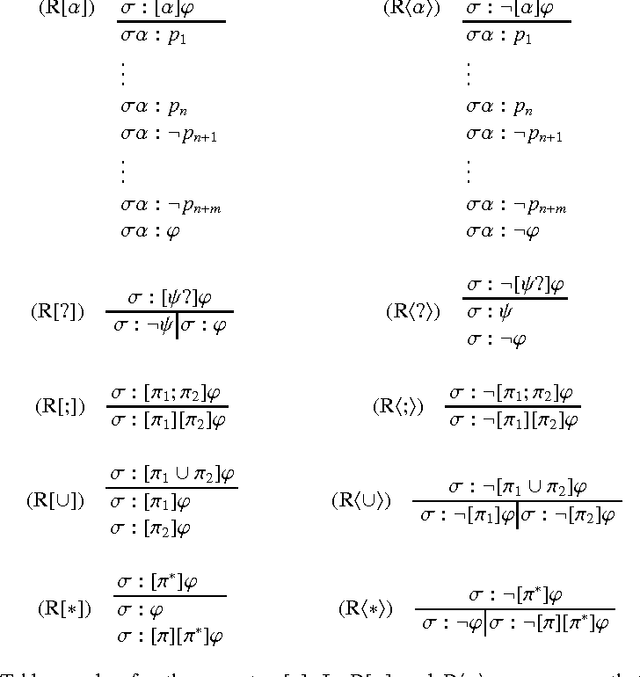
Abstract:The Dynamic Logic for Propositional Assignments (DL-PA) has recently been studied as an alternative to Propositional Dynamic Logic (PDL). In DL-PA, the abstract atomic programs of PDL are replaced by assignments of propositional variables to truth values. This makes DL-PA enjoy some interesting meta-logical properties that PDL does not, such as eliminability of the Kleene star, compactness and interpolation. We define and analytic tableaux calculus for DL-PA and show that it matches the known complexity results.
An Ordinal View of Independence with Application to Plausible Reasoning
Feb 27, 2013Abstract:An ordinal view of independence is studied in the framework of possibility theory. We investigate three possible definitions of dependence, of increasing strength. One of them is the counterpart to the multiplication law in probability theory, and the two others are based on the notion of conditional possibility. These two have enough expressive power to support the whole possibility theory, and a complete axiomatization is provided for the strongest one. Moreover we show that weak independence is well-suited to the problems of belief change and plausible reasoning, especially to address the problem of blocking of property inheritance in exception-tolerant taxonomic reasoning.
Metatheory of actions: beyond consistency
Mar 09, 2006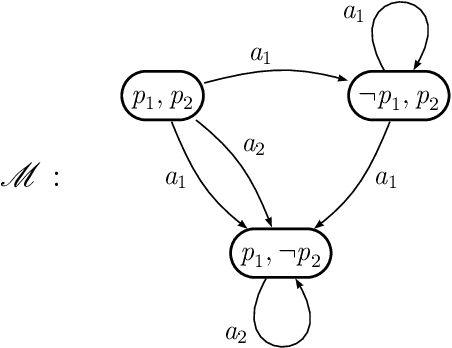
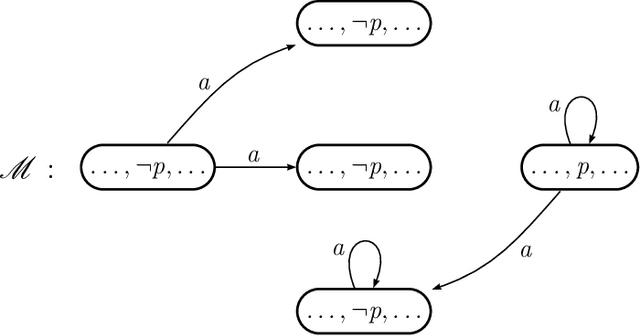
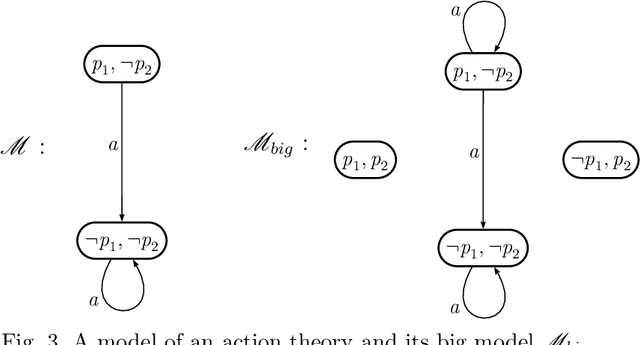
Abstract:Consistency check has been the only criterion for theory evaluation in logic-based approaches to reasoning about actions. This work goes beyond that and contributes to the metatheory of actions by investigating what other properties a good domain description in reasoning about actions should have. We state some metatheoretical postulates concerning this sore spot. When all postulates are satisfied together we have a modular action theory. Besides being easier to understand and more elaboration tolerant in McCarthy's sense, modular theories have interesting properties. We point out the problems that arise when the postulates about modularity are violated and propose algorithmic checks that can help the designer of an action theory to overcome them.
 Add to Chrome
Add to Chrome Add to Firefox
Add to Firefox Add to Edge
Add to Edge